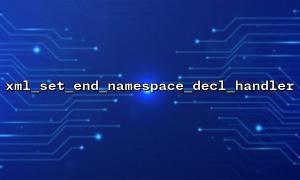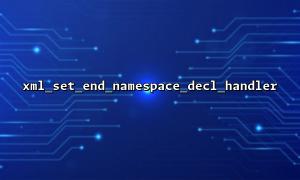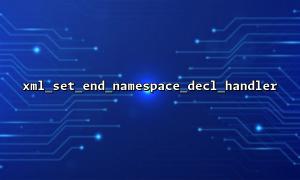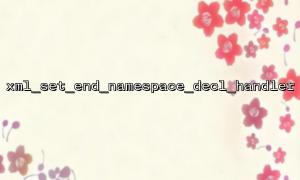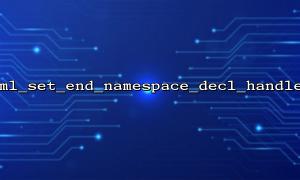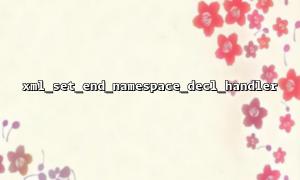The basic syntax of the xml_set_end_namespace_decl_handler function is as follows:
bool xml_set_end_namespace_decl_handler(resource $parser, callable $handler);
$parser : This is an XML parser resource created through the xml_parser_create function.
$handler : A callback function triggered when the namespace ends. This function takes two parameters: $parser and prefix of the namespace.
A simple example:
<?php
// createXMLParser
$parser = xml_parser_create();
// Define callback function at the end of the namespace
function end_namespace_handler($parser, $prefix) {
echo "Namespace '$prefix' has ended.\n";
}
// Set callback function
xml_set_end_namespace_decl_handler($parser, 'end_namespace_handler');
// ExampleXMLdata
$xml = '<root xmlns:foo="http://example.com"><foo:bar></foo:bar></root>';
// AnalysisXML
xml_parse($parser, $xml);
// 释放Parser
xml_parser_free($parser);
?>
The above code will output:
Namespace 'foo' has ended.
To ensure that the xml_set_end_namespace_decl_handler callback function is executed correctly, we can use some debugging techniques to troubleshoot potential problems.
First, make sure xml_parser_create successfully creates the parser. Before creating the parser, we can verify its return value first, making sure it is not false .
<?php
$parser = xml_parser_create();
if (!$parser) {
echo "Failed to create XML parser.\n";
exit;
}
?>
In the callback function, we can use var_dump or echo to output $prefix and other debugging information. This can help us confirm whether the callback function is called correctly.
function end_namespace_handler($parser, $prefix) {
echo "Namespace '$prefix' has ended.\n";
var_dump($prefix);
}
When parsing XML documents, you may encounter syntax errors or incorrectly formatted XML data. To facilitate debugging, we can add an error handling mechanism during parsing and use xml_get_error_code to obtain detailed error information.
<?php
// createParser
$parser = xml_parser_create();
// Error handling
function handle_error($parser) {
$error_code = xml_get_error_code($parser);
echo "Error: " . xml_error_string($error_code) . "\n";
exit;
}
// Set namespace end callback
xml_set_end_namespace_decl_handler($parser, 'end_namespace_handler');
// Example无效XML
$xml = '<root xmlns:foo="http://example.com"><foo:bar></foo:bar>';
// AnalysisXMLAnd check for errors
if (!xml_parse($parser, $xml)) {
handle_error($parser);
}
// 释放Parser
xml_parser_free($parser);
?>
When we process XML data containing namespaces, $prefix may be an empty string representing elements without namespaces. Make sure to handle this in the callback function to avoid unnecessary errors.
function end_namespace_handler($parser, $prefix) {
if (empty($prefix)) {
echo "No namespace prefix declared.\n";
} else {
echo "Namespace '$prefix' has ended.\n";
}
}
When using xml_set_end_namespace_decl_handler , the callback function must be a legal callable function. We can check whether the callback function is valid by using is_callable .
<?php
$parser = xml_parser_create();
$handler = 'end_namespace_handler';
if (!is_callable($handler)) {
echo "Handler function '$handler' is not callable.\n";
exit;
}
xml_set_end_namespace_decl_handler($parser, $handler);
// AnalysisXML
$xml = '<root xmlns:foo="http://example.com"><foo:bar></foo:bar></root>';
xml_parse($parser, $xml);
xml_parser_free($parser);
?>

